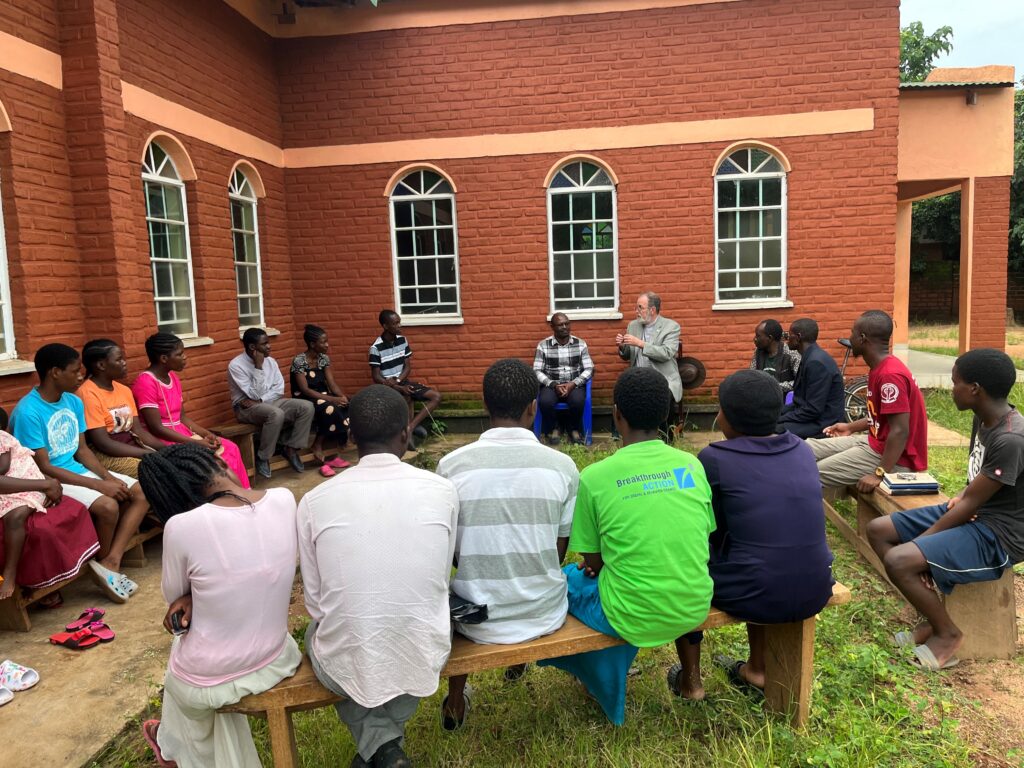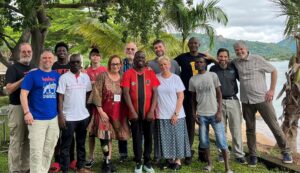
Ten team members from Pittsburgh Presbytery spent time in Malawi in March during a historic cyclone that dumped 24 inches of rain on the African country in two days. And through it all, their Malawian hosts stayed calm and kept everyone safe.
Since a formal partnership began between Pittsburgh Presbytery and the Blantyre Synod of Southern Malawi in 1991, regular trips have been made in both directions by those who are invested in this important relationship. With a three-year hiatus from 2020-22 halting travel between the two Presbyterian mid councils because of the coronavirus pandemic, the 10 pilgrims traveling from Pittsburgh to Africa in March knew it would be a memorable excursion. And the two-week trip certainly did not disappoint, but not for the obvious reasons.
Cyclone Freddy, the worst such natural disaster in the history of Malawi that dumped 24 inches of rain in two days on the country, arrived just as eight of the 10 team members from Pittsburgh were landing in southeastern Africa. While the storm didn’t disrupt the trip as much as one might think, thanks in large part to the work of the Malawians who did their best to make sure the Americans were safe and went about their business as usual, it did leave the group with many unforgettable images in their thoughts and cameras.
“The evidence of devastation was astounding – the view of debris up in trees, the level of areas that were completely washed away,” said Eddie Willson, the current moderator and chair of the longstanding partnership for Pittsburgh Presbytery. “There were areas where you could tell entire crops had just been completely wiped flat. Trees were flattened, and the roads were probably the biggest thing that we saw. There was nowhere that we went that there wasn’t some part of a road completely washed away, and we were on the main roads.”
“Particularly in some of the places where it hit,” added Dave Carver, “you’re talking about dwellings that have thatched roofs and mud brick. That’s fatal. I drove by several places where the road was just washed away, where what had been a two-lane paved road was now three-quarters of a lane and then a giant sinkhole.”
Eddie and Dave, the latter of whom has been to Malawi nearly two dozen times both through the partnership and for personal vacations, spent the first six days of the trip in South Sudan, which is an area that makes up the third part of Pittsburgh Presbytery’s tripartite relationship with the African countries. Because South Sudan is 1,400 miles from Malawi, Eddie and Dave were seeing news reports of the devastation from Cyclone Freddy while the rest of the group was experiencing it firsthand.
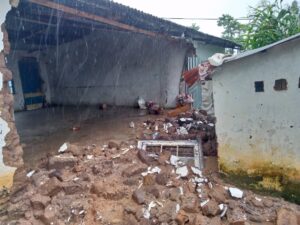
This nursery school was destroyed by the rains, a building the team from Pittsburgh had visited just hours before.
“We were in constant contact with them,” Eddie recalled. “They were keeping us apprised of what was going on in the country. Pastor Dave and I have good relationships with other folks in the country that were with our pilgrims that were able to tell us more of what was going on in terms of devastation. Pastor Dave has had 30 years of building relationships, so he had close friends and relations sending him messages that were even more detailed than what we could get on the news.
“It wasn’t until he started getting those WhatsApp messages that we really started to realize the devastation of Cyclone Freddy and realized that the objective of our trip changed.”
With Pittsburgh Presbytery historically traveling to Malawi on the odd-numbered years while its African partners make the return visit during the even-numbered years, the journeys by Pittsburgh Presbytery normally occur during the summer months, which coincides with Malawi’s dry season. In 2023, however, after not having been to the African country since 2019, the trip was scheduled for mid-March at the end of its rainy season.
“God knew we were to be in the country and God wanted us to be there,” Eddie said. “It was evident from day 1 that God wanted us to be there. We could see God’s work in the level of hospitality shown by our hosts as well the speed with which Malawians came to each other’s aid. We saw God’s work in the little bit of work we were able to do in trying to raise funds for disaster relief. Us being there allowed for a stronger spotlight to be on the country when they needed it most.”
Through those personal experiences, nearly $20,000 has been raised through Pittsburgh Presbytery to help with the relief efforts in Malawi. (To donate, send checks to Pittsburgh Presbytery, 901 Allegheny Ave., Pittsburgh, PA 15233; care of: Malawi Disaster Relief Fund.)
Each visit has a theme, and because of the four-year span between trips, the 2023 journey was billed as “Renewal.” In 2019, the trip was tagged “Youth Development and Mental Health Among Youth” and included nine youth from Pittsburgh Presbytery who were involved in the facilitation of three youth conferences in Malawi.
“The primary goal is to have collaborative time to talk about whatever the theme is and to learn from one another,” Eddie explained. “One of our foundational verses is Romans 1:12 where Paul states that we should be mutually encouraged by each other’s faith. The main mission is to be ‘mutually encouraged’ but within the context of a scope of a theme.”
“Malawi is a very stable and historically peaceful country,” Dave added, “and yet as we think about a theme for our next time together, one of the things we have identified is that in each of our cultures (USA, Malawi and South Sudan) there is an increasing risk of tribalism. The church is called to look for ways to bring a unifying witness to folks who have different ideas and experiences.”
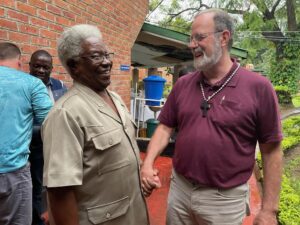
Dave Carver chats with the Rev. Silas Ncozana, who was the General Secretary of CCAP Blantyre Synod and one of the architects of the partnership at its founding in 1991.
“We are not here to make Malawi like America or make the CCAP (Church of Central Africa Presbyterian) like the PCUSA [Presbyterian Church (U.S.A.)],” continued Tyler Domske, the pastor at Wexford Community Presbyterian Church. “We are here to learn from each other, but even more to see the other as true siblings in Christ. We learn from them, but also simply build friendships and relationships with them. Communion is not meant to be transactional, and the partnership is not predicated on trading goods or methods between the partners, it is about forming community that transcends culture and geography and helps us to truly live into a practiced understand of the one, holy apostolic church.”
While some of the earlier trips to Malawi by Pittsburgh Presbytery have included construction projects, for the past 15 years the visits have focused on learning experiences that are mutually beneficial. This year was no different as the schedule for the trip was broken into three parts: 1) getting to know the country, 2) connecting with sister churches and experiencing what life is like in a Malawian church community and 3) defining what the group experienced and how it can continue to build, renew and strengthen these partnerships.
“Much of that first part of the agenda was shifted because of the cyclone,” Eddie said. “Many of the activities were either shortened, canceled or delayed.
“Our Malawian hosts did a great job of bringing Malawians to where our pilgrims were. They wanted them to be safe, so for the most part they stayed at Grace Bandawe (Conference Center), but five choirs came to Grace Bandawe, several church leaders came to Grace Bandawe. They drove to a few of the areas in Blantyre and saw the synod offices and university. For the most part they stayed in place and Malawian hosts came to them.”
“We were never in danger, and every effort was made to keep us safe, but also to still show us the best Malawi had to offer (even in the midst of a national emergency),” Tyler added. “They knew that for many on the trip, this might be our only time in country, and we were still given every chance to see the beauty and hope of the Malawian people and the nation.”
Because of the effects of the cyclone, as they were flying from South Sudan to Malawi Eddie and Dave discussed how the trip would have to be altered in terms of its goals.
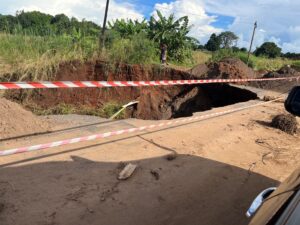
Many roads in Malawi were partially or completely washed away due to the torrential rains caused by Cyclone Freddy.
“We quickly established together that our number one objective after Cyclone Freddy was to stay out of the way,” Eddie said. “We wanted to ensure that we were not in the way of relief efforts nor that we were pulling away any resources from those disaster relief efforts that were going on. The second and third legs of the trip looked very similar to the way that it was planned because we wanted to be out of the way and we didn’t want to ruffle any feathers with what we were doing while we were all working together to ensure that we were bringing as much attention to the disaster relief efforts as possible so that we could at least channel resources from Pittsburgh to our partners in Malawi.
“We knew it wouldn’t do a whole lot of good for 10 Americans from Pittsburgh to go down and try to shovel mud and then have Malawians who actually knew what they were doing to have to do it again. It was powerful for us to be able to send emails and Facebook messages back to the U.S. to say this is really devastating and we are here and able to see some of it.”
Tyler agreed that the Pittsburgh team staying out of the way instead of trying to lend assistance in a foreign country during this incredibly hectic time was the proper way to respond.
“I was particularly moved by the Malawian response to the tragedy,” he said. “We have a ‘fix it’ mentality as Americans, particularly in regard to international needs, and so it was humbling to be in a position where it was clear that we could not fix this problem, and moreover that our ‘solutions’ would have been not very helpful. There is nothing that the 10 of us Americans could have done that wouldn’t have been done better and more efficiently by one Malawian.”
What Tyler saw firsthand from the Malawians is something that will have a lasting effect on him.
“Immediately, there was assistance and aid offered to the communities hardest hit,” he recalled. “Churches were overflowing with clothing and food to give to the affected communities, and housing was provided by close neighbors and family. Where the Western approach would have been to set up some sort of task force or fund, and to donate to the Red Cross or some other government organization, we saw neighborhoods and churches simply jumping into action on their own. The organizations and funds will be necessary for the recovery, but the immediate need was not for aid programs, but for neighbors. Malawians did this far better than I’ve ever seen in the Western world.”
The first conversation about the cyclone between the 10 pilgrims from Pittsburgh Presbytery was on the day they traveled from Pittsburgh to Dulles International Airport in Washington D.C. News reports were beginning to show that the severe weather pattern was shifting back to Malawi, a path that was not predicted when the cyclone’s original track was forecast.
“At that point I don’t think anyone in our group, myself included, had any idea of the potential devastation of the cyclone,” Eddie said. “We thought, it’s the end of the rainy season, clearly there is this storm coming through and it looks like there is going to be a lot of rain, but we didn’t have any perception of the level of effect of the storm at that point.”
The day that Eddie and Dave landed in Ethiopia to change flights to head to South Sudan while the rest of the group continued to Malawi was the same day Cyclone Freddy arrived in Malawi. The severe storm stayed there five days, pounding the mountainous country with 2 feet of rain and causing unparalleled devastation.
“It wasn’t until we had pilgrims in country that the worst of the storm was starting to hit,” Eddie continued. “They were actually in Blantyre, which was hit the hardest in the country. Even though they stayed sheltered in place, they were experiencing a lot of the rain and storm along with the rest of the city in Blantyre.”
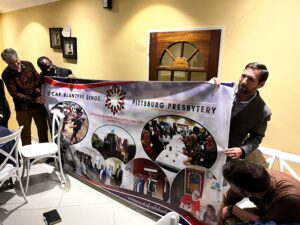
Elder Eddie Willson (right) accepts a banner from Blantyre Synod’s General Secretary, the Rev. Billy Gama, while the Rev. Ted Martin (left) from Hampton P.C. looks on.
While the cyclone greatly affected that first third of the trip that was designated for exploring the country, an incredible positive came from it. The hospitality shown to the Americans by the Malawians during this unprecedented weather disaster is something that will forever be remembered.
“Our hosts had a great anxiety and fear that they might be putting us in harm’s way,” Dave explained. “We came to see the impact of these long-term relationships that we’ve been able to develop. This was a moment – and the Malawians mentioned this to me several times – ‘To think that you were here when this happened! You can go back and tell the story and people in America won’t believe that you lived through this.’
“Their fear of causing us anxiety meant sometimes that the folks who were on the lead team ahead of Eddie and me didn’t really know how bad things were. They were being shielded from the full brunt – they were just told that ‘We are changing the plan today,’ not ‘The bridge is washed out so we can’t possibly get any vehicles down there and we’re afraid you’ll drown, so we’re not going.’ Just ‘Change of plans, we’re going to be over here today.’
“If the purpose of the trip is to mutually encourage one another, I think that the presence of this small team from Pittsburgh when some of our neighbors were having their worst day was probably a good thing.”
Through it all, despite all of the inconveniences this incredible weather disaster caused, this trip has created an even tighter bond between Pittsburgh Presbytery and its friends in Malawi.
“We saw God at work around every corner, in every meal, in every smile and picture taken with new Malawian friends, in the growth of my team, in the powerful hope of a country that is in the midst of tragedy, in the beauty of a world so foreign yet so familiar,” Tyler said. “God is doing a new thing in this partnership. It is good for us to not slide into old models or old approaches to international connections. This is new. This is the Body of Christ for today and will help us to see and understand and live into the Body of Christ for the years to come.”
“I’ve been to Malawi twice,” Eddie added, “and both trips were life-changing. This trip with Cyclone Freddy put a lot of my day-to-day concerns into perspective. I don’t have to worry about rain washing away my home, and many people that I consider friends and really great partners do.”
“I felt the hand of God in the chemistry of the company,” Dave concluded. “The team that showed up was not necessarily the team that was assembled. There were some late additions and late departures, but the folks who were there, it was just amazing to see how they were able to dive in and process and celebrate the presence of the Holy in the midst of pain.
“I can only see this deepening relationships, particularly between the folks who were able to travel and our hosts. This trip has cemented some of the things that I’ve known about Malawi. It has reinforced the way that I celebrate the folk in Malawi who are so hospitable and so gracious and who are teaching me every day the importance of being fully present in the moment and attentive to one another. I’m overwhelmed, again, by relearning these truths of what it means to try to be faithful in the midst of a challenge.”

